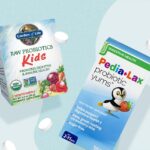Can Probiotics Cause Constipation?

According to a National Health Interview Survey (NHIS), about 4 million (1.6 percent) U.S. adults had used probiotics or prebiotics in the past 30 days. Among adults, probiotics or prebiotics were the third most commonly used dietary supplement other than vitamins and minerals.
Probiotics are live bacteria and yeasts that may benefit a person’s health. They are present in the human digestive system and in some foods and supplements. Probiotics are useful bacteria. They exist throughout the body, although people largely associate them with the stomach and intestines. As evidence of a link between the gut microbiome and overall health grows, interest in probiotics is increasing.
People often consume probiotics in the hope of balancing their intestinal flora, also known as the gut microbiome. There are many strains of probiotic bacteria, but the main ones are of the Lactobacillus or Bifidobacterium groups.
Prebiotics are different from probiotics. They are nutrients in food. The body does not digest prebiotics, but these nutrients help stimulate the growth or activity of useful bacteria. Food sources of probiotics include fermented foods, such as some yogurts and kimchi. Probiotic supplements are also available.
What is constipation?
Constipation is a condition in which a person has uncomfortable or infrequent bowel movements. Generally, a person is considered to be constipated when bowel movements result in passage of small amounts of hard, dry stool, usually fewer than three times a week. However, normal stool elimination may consist of having a bowel movement three times a day or three times a week; it depends on the person.
About 4 million people in the United States have frequent constipation. Constipation is the most common gastrointestinal complaint, resulting in 2.5 million doctor visits annually.
Hard, dry stools are the result of the colon absorbing too much water. Normally, as food moves through the colon (also known as the large intestine) the colon absorbs water while forming stool (waste products). Muscle contractions then push the stool toward the rectum, and, by the time the stool reaches the rectum, most of the water has been absorbed, making the stool solid.
When the colon’s muscle contractions are slow or sluggish, the stool moves through the colon too slowly, resulting in too much water being absorbed.
Do probiotics work against constipation?
Yes, some types of probiotics may help relieve constipation. In fact, prebiotics are known to improve stool frequency and consistency, and when combined with probiotics may also provide even more benefits for constipation.
Researchers at King’s College in London scoured the medical literature and found 14 studies that met their criteria for a well-done study. All were clinical trials that randomly assigned people with constipation to take either probiotics or a placebo (or other control treatment).
By pooling the findings of the trials, the researchers found that on average, probiotics slowed “gut transit time” by 12.4 hours, increased the number of weekly bowel movements by 1.3, and helped soften stools, making them easier to pass. Probiotics that contained Bifidobacterium appeared to be the most effective. The study was published in the American Journal of Clinical Nutrition. There is evidence that probiotics may help treat irritable bowel syndrome (IBS). A 2019 review concluded that a multi-strain probiotic might improve IBS symptoms. The researchers called for further investigations into whether strains of Akkermansia, Bacteroides, and Faecalibacterium bacteria could play a role in future therapies. A different 2019 review found that probiotics did not consistently support the treatment of inflammatory bowel disease, or IBD, except possibly for one type of the disease: ulcerative colitis.
Can probiotics cause constipation?
Yes, probiotics can cause constipation in some people some people because they react poorly to ingredients used in probiotic supplements or to naturally occurring amines in probiotic foods resulting in a temporary increase in gas, bloating, constipation and thirst, especially in children that consume too much probiotics.
How long does it take probiotics to work for constipation?
The duration of studies showing the efficacy of probiotics generally spanned four weeks to ninety days. Even though research can’t give us a definitive answer, many people report feeling better within hours or days of taking a high-quality, multi-strain supplement.





